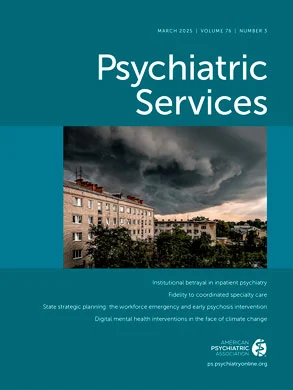To the Editor: Hungary and other countries that have made the transition from a communist government are in an optimal position to implement best practices in mental health care. In our pilot study we enlisted the help of an independent polling organization to survey 200 persons with schizophrenia to assess their service-related needs and their opinions of these services. We involved the independent polling organization because we wanted to increase the impact of our research in the media and among decision makers and the public. We avoided recruiting participants from medical institutions, not only because of data protection rules but also to have a varied sample, because medical institutions in Hungary encourage patients to be dependent on their services.
We prepared a questionnaire with 58 items to gather comprehensive information from persons with schizophrenia about their personal situations, level of impairment and disability, desires, use of services and treatments, drug treatment, relationship with professionals, satisfaction with the information given to them, and knowledge of schizophrenia. The survey used a sociological approach. That is, we treated the participants as a social group with similar interests, not as sample of patients with individual symptoms or problems. We assessed needs and opinions instead of symptoms or other psychological characteristics. A leader of a user's advocacy organization took part in preparing the questionnaire and two members of the organization put together the survey. The advocates recruited 31 study participants from consumers served by the organization, and the other 169 participants were recruited through referrals from these consumers. Participants self-reported that they had schizophrenia. The sample was not representative of persons who have schizophrenia in Hungary, but it represented nearly 1 percent of currently documented patients.
Results of the survey were similar to those of other studies (
1,
2). Our survey showed that participants viewed schizophrenia as being related to a significant level of disability, social isolation, and discrimination and social disadvantage (for example, homelessness and unemployment). The survey also showed that the main goal of consumers was to recover from schizophrenia (48 participants, or 24 percent), become employed (20 participants, or 10 percent), earn a higher income (20 participants, or 10 percent), and improve relationships with partners and family members (38 participants, or 19 percent) and with children (eight participants, or 4 percent).
Our survey showed that participants viewed schizophrenia as being related to a significant level of impairment (114 participants, or 57 percent), disability (80 participants, or 40 percent), and discrimination and social disability (104 participants or 52 percent). Eighty-four respondents (42 percent) were unemployed, and respondents reported that unemployment was one of the main reasons for discrimination and social disability.
Most respondents preferred receiving community-based services rather than services in various institutions. Most respondents preferred receiving treatment in community outpatient clinics (106 respondents, or 53 percent), sheltered workshops (98 respondents, or 49 percent), day clubs (74 respondents, or 37 percents), home care (56 respondents, or 28 percent), and sheltered housing (52 respondents, or 26 percent). Not as many respondents preferred receiving treatment in the hospital (28 respondents, or 14 percent), hospital outpatient clinics (30 respondents, or 15 percent), and social care homes (44 respondents, or 22 percent).
Pharmacotherapy was the most available treatment: a total of 192 respondents (96 percent) had used medication in the past. However, although 156 respondents (78 percent) reported that they needed rehabilitation related to self-care, employment, and relationships, only 78 (39 percent) had received it in the past.
Among the community-based services, the interventions most preferred were pharmacotherapy (154 respondents, or 77 percent) and rehabilitation related to self-care, employment, and relationships (156 respondents, or 78 percent). Electroconvulsive therapy was negatively viewed by most respondents (198 respondents, or 99 percent), even though approximately half the patients who received such therapy reported that it had helped them (33 of 70 respondents, or 47 percent). When participants were asked to rate how helpful professionals were in providing services, only 20 respondents (10 percent) stated that nonmedical staff (for example, social workers and psychologists) were the most helpful, 106 (53 percent) found that psychiatrists were the most helpful, and 58 (29 percent) reported that nurses were the most helpful.
Clients with schizophrenia were able to express and articulate their needs in a way that can be used for service planning (
1,
3). The sociological approach of a public survey proved to be a useful way of assessing the needs and interests of a broad group of consumers similarly to other social groups. The method was also useful for educating the media, educating the community, and influencing decision makers. Respondents stated that having schizophrenia was a significant impairment and disability. Respondents preferred pharmacotherapy and rehabilitation to be provided on a community basis, but the current system in Hungary offers mainly biological therapies and institution-based services provided by medical staff.

